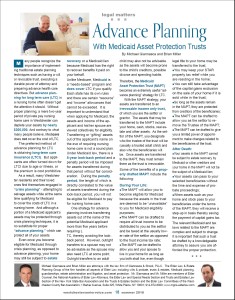Advanced Planning With Medicaid Asset Protection Trusts
Many people recognize the importance of implementing traditional estate planning techniques such as having a will or revocable trust, executing a durable power of attorney and preparing advance health care directives. But advance planning for long term care (LTC) in a nursing home often doesn’t get the attention it should. Without proper planning, a mere two-year period of private pay nursing home care in Westchester can deplete your assets by nearly $300,000. And contrary to what many people believe, Medicare does not cover the cost of LTC.
The preferred method of advance planning for LTC is obtaining long-term care insurance (LTCI). But applicants are often turned down for LTCI due to age or illness, or the premium is cost prohibitive.
As a result, many Westchester residents and their loved ones find themselves engaged in “crisis planning” – attempting to salvage assets while at the same time qualifying for Medicaid to cover the costs of LTC in a nursing home. And although a portion of a Medicaid applicant’s assets may be protected through crisis planning techniques, it is no substitute for proper “advance planning,” which can protect all of your assets.
Even once you become eligible for Medicaid through crisis planning, as opposed to advance planning, your home may still be subject to estate recovery or a Medicaid lien because Medicaid has the right to recover benefits it paid on your behalf.
Unlike Medicare, Medicaid is a “needs-based” program and does cover LTC if you qualify. Each state has its own rules and there are certain “resource” and “income” allowances that cannot be exceeded. It is important to understand that when applying for Medicaid, the assets and income of the applicant and his/her spouse are viewed collectively for eligibility. Transferring or “gifting” assets out of the applicant’s name on the eve of requiring nursing home care is not a sound plan. Under Medicaid law, there is a 5-year look-back period and a penalty period will be imposed for assets transferred during that period without fair consideration. During the penalty period, the length of which is directly correlated to the value of assets transferred during the look-back period, you will not be eligible for Medicaid to pay for nursing home care.
One strategy for advance planning involves transferring assets out of the name of the potential Medicaid applicant more than five years before requiring LTC, thereby avoiding the lookback period. However, outright transfers to a spouse may not be advisable as the spouse may also need LTC at some point. Outright transfers to an adult child may also not be advisable as the assets will become prone to the child’s creditors, possible divorce and spending habits.
Therefore, the Medicaid Asset Protection Trust (MAPT) becomes an extremely useful “advance planning” strategy for LTC.
With the MAPT strategy, your assets are transferred to an irrevocable income only trust, of which you are the settlor or grantor. The assets that may be transferred to the MAPT include your home, cash, stocks, real estate and other assets. As the settlor of the MAPT, you designate who the trustee of the trust will be (usually a trusted adult child) and also who the beneficiaries will be. Once assets are transferred to the MAPT, they must remain there as the trust is irrevocable.
Some of the benefits of a properly drafted MAPT include the following:
During Your Life:
• The MAPT will allow you to become eligible for Medicaid because the assets in the trust are deemed to be “unavailable” to you for Medicaid eligibility purposes;
• The MAPT can be drafted to require all trust income to be distributed to you as the settlor and be taxed at the usually lower rate of the settlor as opposed to the trust income tax rate;
• The MAPT can be drafted to allow you and your spouse to live in your home for as long as you both shall live, even though legal title to your home may be transferred to the trust;
• You may keep your STAR property tax relief while you are residing in the home;
• You can still take advantage of the capital gains exclusion on the sale of your home if it is sold while in the trust;
• So long as the assets remain in the MAPT, they are protected from creditors of the beneficiaries;
• The MAPT can be drafted to allow you as the settlor to remove the Trustee of the MAPT;
• The MAPT can be drafted to give you a limited power of appointment to make changes related to the beneficiaries of the trust.
After Death:
• Your assets in the MAPT cannot be subject to estate recovery by Medicaid or other creditors and your home in the MAPT will not be the subject of a Medicaid lien;
• Your assets can pass to your selected beneficiaries without the time and expense of probate proceedings;
• When assets such as your home and stock pass to your beneficiaries under the terms of the MAPT, they will receive a step-up in basis thereby saving the payment of capital gains tax.
The relevant Medicaid and tax laws related to the MAPT are complex and subject to change. It is important that such a trust be drafted by a knowledgeable attorney to assure you are afforded the proper protection.
As published in Westchester Senior Voice – Summer 2016.

